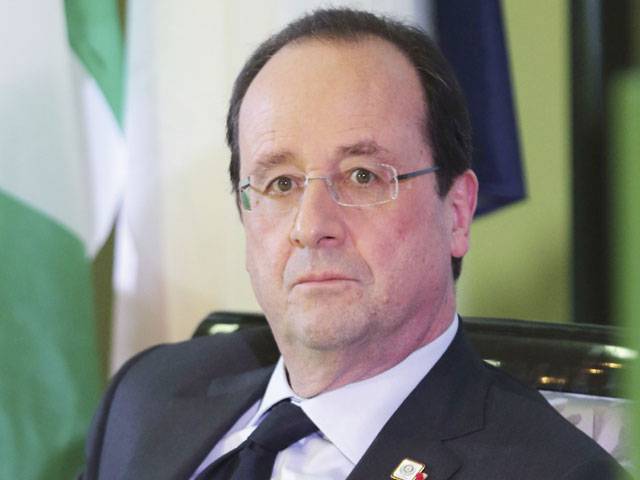BANGUI, Central African Republic (AFP): French President Francois Hollande arrived in the Central African Republic on Friday, nearly three months into a difficult mission to stop the sectarian bloodshed sweeping the country.
His high-security visit to Bangui caps a week that saw the French parliament extend Operation Sangaris and another 400 extra troops arrive in the deeply unstable former French colony.
Hollande is due to meet interim president Catherine Samba Panza as well as French troops who were first sent in to try to quell the seething violence in early December. Panza has urged France and the African Union to make full use of their UN mandate to “wipe out these unchecked elements that poison our lives”. Paris has acknowledged that its troops face considerable difficulties in halting the bloodshed.
But France’s top commander in Bangui, General Francisco Soriano, said Thursday that the Central Africans needed to start doing their share. “Central Africans need to participate in the reconstruction of their own country. We already do a lot,” he told AFP.
Hollande visited the former colony for the first time in early December, days after French troops poured into the country to cheers from villagers.
Three months on, there is more hostility towards the French, as the violence has continued to escalate, sparking warnings by top aid officials that ethnic cleansing was under way. “No need to come Mr Hollande, we’re already dead,” said one Muslim woman in a Bangui street.
Nearly a quarter of the 4.6-million Central African population has been displaced since the start of the conflict.
Relief organisations have warned that the flight of Muslims - who controlled a large share of trade and farming - risked exacerbating a major food crisis in what was already one of the world’s poorest countries before the conflict.
Rebels from the mainly Muslim Seleka group seized power nearly a year ago but some went rogue and mostly Christian vigilantes formed in response to a campaign of abuses.
Michel Djotodia, the Seleka leader who became the country’s first Muslim leader, was forced to quit in January but the “anti-balaka” self-defence groups have in turn escaped the control of the authorities and are continuing to commit atrocities. “We need to work more with the police to put them back in the saddle,” Soriano said.
He conceded however it was a problem that many in the security forces went unpaid.
On Thursday, a convoy of around 50 armoured vehicles and lorries entered the country from Chad, carrying 400 additional French troops to reinforce the 1,600 already on the ground.
The European Union has also pledged between 800 to 1,000 troops but negotiations on which countries will provide them are still going on.
Georgia, anxious to cement good ties with the EU, said Thursday it would contribute 150 troops to the European mission.
Despite concerns that France could get bogged down in a war offering little prospect of a clear-cut success, parliament approved the extension of Operation Sangaris on Tuesday.
But Paris is urging the United Nations to expedite plans to take over the lead role in peacekeeping efforts.
A police officer in the Republic of Congo was quoted Thursday as saying that a man who calls himself the coordinator of the anti-balaka had been arrested on Tuesday.
Patrice Edouard Ngaissona, a minister in the Francois Bozize regime ousted by Seleka in March last year, was arrested in northern Congo and transferred to Brazzaville.
He later denied the report, saying he had neither been arrested nor moved to Brazzaville.
Friday, April 19, 2024
Hollande in C Africa as France digs in

Caption: Hollande in C Africa as France digs in
Court approves plea bargain of Parvez Elahi’s co-accused
April 19, 2024
Zardari creates another parliamentary record
April 19, 2024
KP politicians, civil society laud President’s address
April 19, 2024
KP minister briefed on issues about sales tax on services
April 19, 2024
Hepatitis Challenge
April 18, 2024
IMF Predictions
April 18, 2024
Wheat War
April 18, 2024
Rail Revival
April 17, 2024
Addressing Climate Change
April 17, 2024
Justice denied
April 18, 2024
AI dilemmas unveiled
April 18, 2024
Tax tangle
April 18, 2024
Workforce inequality
April 17, 2024
New partnerships
April 17, 2024
ePaper - Nawaiwaqt
Advertisement
Nawaiwaqt Group | Copyright © 2024





